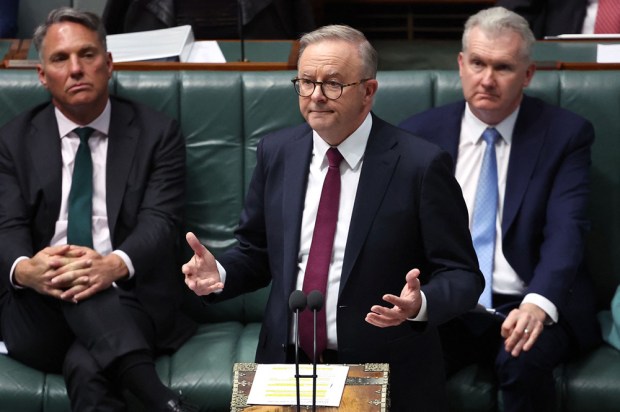Like some banana republic, Australia is in the middle of an attempted coup. Not by the army, but by the commentariat. Their theme is ‘Tony Abbott must change, and anyway, his government is doomed.’ Most political news is tailored to fit this agenda.
Long their bête noire, Abbott has, in the surprisingly short period he has been in office, dared to do exactly what they said should not be done. Worse, he did what they said was impossible.
Fundamental change is needed, but not by Abbott. Of all potential leaders, Liberal or Labor, he is by far the one most capable of delivering solutions to crucial issues facing Australia, solutions mostly opposed by the commentariat. These include protecting our borders, dealing very firmly with the jihadist fifth column, opening up trade, calming the global warmists, halting the persecution of our farmers, protecting private property, weaning the undeserving off welfare and saving future generations from Labor’s massive debt. Just the annual interest on this could build twelve new hospitals.
It is precisely because he shows every sign of solving these issues that the mainly left of centre commentariat long ago decided he should go, just as they had −for so long unsuccessfully − decided John Howard should go. Howard went over their heads refusing to be interpreted by the gallery. He spoke to the people simply, directly and unedited live on talk back radio and breakfast TV.
The commentariat believes they delivered the coup de grâce when, by lies and omissions, they portrayed Prince Philip’s knighthood as a sacking offence worse than throwing open the borders and letting hundreds die. Or so negligently installing pink batts that houses were set on fire and four young workers killed.
At that stage some normally conservative commentators joined the coup, an action they will regret. Perhaps they were infected by that usually hidden media malady, an addiction to change, even change for the worse. Paul Kelly let the cat out of the bag early in the republican campaign, when he admitted that ‘the media has a vested interest in change – change equates to news, and news is the lifeblood of the media.’
This attempted coup is not just about Tony Abbott. It is about the policies he is pursuing. The agenda is clear − Abbott’s replacement will go soft on such matters as border control and jump onto the global warming bandwagon. To guarantee this, it’s likely he or she will soon be undermined to ensure the Coalition loses the next election.
Don’t be at all surprised that the polls prefer Bill Shorten as prime minister. Most working people have neither the time nor the taste for detailed political analysis. For them, news comes from a TV set on while they are doing other things. In the typical bulletin, the major political story is introduced in the headlines, often crafted to put the government in a poor light. When the story is reached, the presenter crosses to their favoured journalist in the parliamentary press gallery. He or she will more often than not blatantly flout the basic ethical rule for good journalism, ‘Comment is free, but facts are sacred’. Instead, the gallery’s current interpretation, almost always anti-Abbott, is presented as fact.
So they have massively downplayed all of Abbott’s many successes, as well as the excesses of the previous government. The quite moderate 2014 budget was universally portrayed as ‘harsh’; a ridiculous exaggeration, but by repetition it has prevailed. Doesn’t anyone know about, say, Arthur Fadden’s ‘horror’ budget? In any event this is the shabby way political news is presented to most people. Is it little wonder, then, that one of the most successful governments in recent years is so low in the polls? Fortunately this influence should decline in future years as technology forces change. The advent of talkback provided a mainly conservative balance, so will internet TV news.
Just as the commentariat exercises power without responsibility, ‘the prerogative of the harlot throughout the ages’, so do the major parties. Put aside their acceptance of an electoral system wide open to fraud, their brazen theft of most voters’ senate preferences, or even Labor’s hypocritical opposition to the very measures it proposed in the election.
The spill motion against the Abbott government is a classic example of how our major political parties still exercise power in a time warp redolent of the smoke filled rooms of Tammany Hall. By way of contrast, almost every major party in any comparable country is open, transparent and democratic.
That motion was an egregious exercise of power without responsibility. Mostly faceless, its proponents sought to topple the very man who had reversed their miserable fortunes, brought down two prime ministers, turned a first term Labor government into a minority government, delivered victory a little over a year ago and is today undoubtedly best placed to put Australia back onto a correct path. In the meantime Senator Sinodinos was able to demonstrate that in our parties there is one law for the establishment and one for the rank-and-file.
With absolute impunity, he gave a running commentary on the spill motion and even qualified his support for the man who had stood by him for so long. A humble preselector in NSW would be hung, drawn and quartered if he dared say more than good morning to a journalist. What better argument could there be for John Ruddick’s proposal that senate candidates be chosen not by factional powerbrokers but through a democratic vote of all state party members?
Many Liberal Party members are asking why they are not consulted in who is to be the leader, as the Labor Party does. In the British Conservative Party, the membership actually elects the leader.
It’s time for the Liberal party to ditch the powerbrokers, stop gagging the rank-and-file, and give them the vote. In other words, to move into the twenty first century.Were the faceless men and women to try this again, there would be outrage among the Liberal rank-and-file. To the overwhelming majority this would be unacceptable.Perhaps it’s time for a ‘captain’s pick’ to clean up the mess. As a minimum, voting on any future spill motion must not be cast in some coward’s castle. It must be by an open vote, with the members − all of them − voting too.
Got something to add? Join the discussion and comment below.
Get 10 issues for just $10
Subscribe to The Spectator Australia today for the next 10 magazine issues, plus full online access, for just $10.
You might disagree with half of it, but you’ll enjoy reading all of it. Try your first month for free, then just $2 a week for the remainder of your first year.













Comments
Don't miss out
Join the conversation with other Spectator Australia readers. Subscribe to leave a comment.
SUBSCRIBEAlready a subscriber? Log in